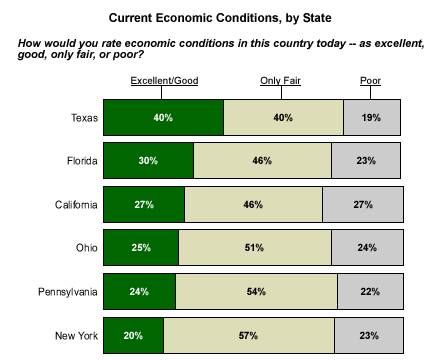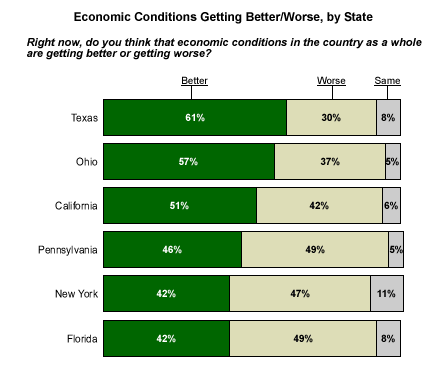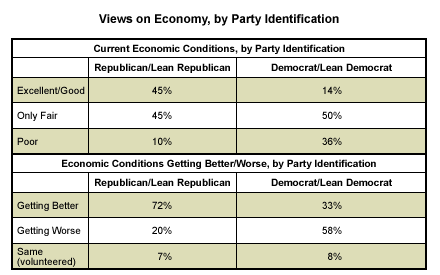Among the multitude of factors influencing Americans' views of the state of the economy, the state they live in may be one of the most significant.
According to Gallup data aggregated during the fourth quarter of 2003*, 29% of Americans nationwide classify current economic conditions as "excellent" or "good," while 47% say they are "only fair" and 24% say they are "poor." About half (51%) believe that economic conditions in the country are getting better, while a large proportion believe things are getting worse (39%). However, when comparing results among residents of six of the most populous U.S. states -- California, New York, Texas, Florida, Ohio, and Pennsylvania -- perceptions of the nation's economic health vary substantially.

Texans were the most likely to express a positive view of the state of the economy during the fourth quarter; 40% of adults in Texas rated it as excellent or good. Perceptions are quite different in the five other large states, where adults are not as likely to feel that things are going so well, with the range of those rating the economy as excellent or good extending from 20% in New York to 30% in Florida. A majority of adults in Pennsylvania, New York, and Ohio describe economic conditions as only fair, as do nearly half of adults in Florida and California.
Opinions on whether economic conditions are improving also depend on one's address. A majority of adults in Texas, Ohio, and California feel that things are "getting better." Optimism is not as prevalent in Pennsylvania, New York, and Florida; in each state, a plurality thinks that things are "getting worse."

Economic conditions can differ widely from state to state depending upon a variety of factors, such as the strength of local industries. However, it's worth noting that opinions on the state of the economy also seem to vary somewhat in accordance with political party affiliation. States that tend to share the political affiliation of the president are the most positive, while those who lean toward the opposite party are most negative. For example, people tend to have a very positive economic outlook in Texas, a state that is heavily Republican. In New York, where people are more likely to lean Democratic, the outlook on the economy is much more pessimistic.
These results most likely stem from the fact that Republicans are more likely to feel positively about the economy when there is a Republican administration in office, while the opposite is true of Democrats. Previous Gallup research suggests that this relationship extends across a variety of social and personal indicators; Americans' outlooks on life are to a not insignificant degree based on the simple fact of whether or not the political party of the president is the same as their own.

*Results are based on telephone interviews with 1,017 national adults, aged 18 and older, conducted Oct. 6-8, 2003, 1,006 interviews with national adults conducted Oct. 24-26, 2003, 1,007 interviews with national adults conducted Nov. 3-5, 2003, and 1,011 interviews with national adults conducted Dec. 11-14. There were 433 interviews conducted in California, 226 in Florida, 244 in New York, 155 in Ohio, 213 in Pennsylvania, and 239 in Texas. There were 1,945 Republicans and 1,744 Democrats. For results based on the entire sample, one can say with 95% confidence that the margin of sampling error is ±2 percentage points. For results based on the Republicans, one can say with 95% confidence that the margin of sampling error is ±2 percentage points. For results based on Democrats, one can say with 95% confidence that the margin of sampling error is ±3 percentage points. For results in California, one can say with 95% confidence that the margin of sampling error is ±5 percentage points. For results in Florida, New York, Texas, or Pennsylvania, one can say with 95% confidence that the margin of sampling error is ±7 percentage points. For results in Ohio, one can say with 95% confidence that the margin of sampling error is ±9 percentage points.
